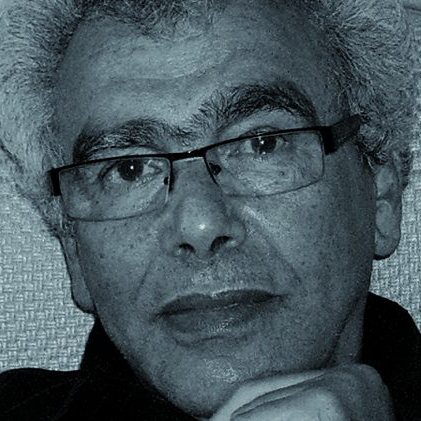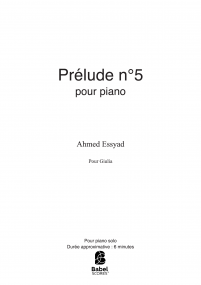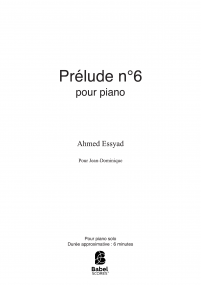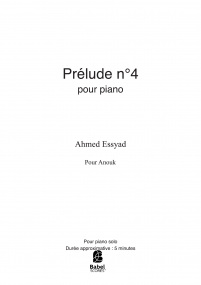
Ahmed Essyad
Play all audio recordingsAhmed Essyad was born in Salé, Morocco. He is of two cultures, Arab-Islamic and Western. His interest in Arab-Andalusian and Berber music has continued throughout his career, nurturing his work, most notably in his reflections on orality.
After studying at the National Conservatory of Music in Rabat, and later at the National Conservatory of Music in Paris, he was the pupil of Max Deutsch in composition and analysis. He soon became Deutsch’s privileged disciple. Deutsch taught him Schoenberg’s greatest lessons, which fortified his innate sense of rigor, respect for craftsmanship, and intellectual and artistic integrities.
The teachings of Max Deutsch allow Ahmed Essyad's early passion for voice, seasoned by the teachings of Max Deutsch, may be found in much of his work: "Identité,” a cantata on a poem by Mahmoud Darwich, created in Paris under Deutsch’s direction in 1973; "Le Collier des Ruses,” a chamber opera in Arabic based on four maqamate texts by Al Hamadani, created at the Festival d'Avignon in 1977; "L'Eau,” an opera with a libretto by Tahar Benjelloun, premiered as an oratorio for Radio-France in 1985; "L'Exercice de l'amour,” a light-opera based on a libretto by Bernard Noël, composed during his residency (1991-1994) at the Chartreuse de Villeneuve-les-Avignon and premiered at Radio-France in 1994; "le Volcan à l’envers,” oratorio composed in La Reunion around a text by Pierre Gamaleya, premiered at Radio France in 1999, on the occasion of the one hundred and fiftieth anniversary of the abolition of slavery; "Héloïse et Abélard,” an opera with a libretto by Bernard Noël, created by the Opéra National du Rhin during the Festival Musica 2000 and resumed in 2001 in Paris at the Théâtre National du Châtelet; "Voix interdites,” a cycle of nine pieces for voice and instrumental ensemble, on poems in Arabic by the great Muslim mystic HALLAJ (857-922), premiered at the Strasbourg Musica Festival in 2005 and resumed at the Queen Elizabeth Hall in London in 2008. "Passion,” for orchestra, was commissioned and performed in 2011 by the Philharmonic of Morocco. In 2012, Radio France’s Festival Presence premieres "Chant Alluvial" for mezzo voices and orchestra on a poem by Ibn Arabi. His preludes for piano were created at the Spring Festival of the Arts in Monaco in April 2014. In 2015 his 3rd quartet with mezzo voice, "Le coeur étoilé,” was performed at the festival of Aix-en-Provence by the quartet Tana and Eva Zaicik. In September 2016, the Musica Festival in Strasbourg and the Opéra National du Rhin presented his latest operas, "Mririda" with a libretto by Claudine Galeaand "Lettre d'amour,” with the Accrochenote ensemble. He is currently preparing a fourth string quartet for the Tana quartet.
The lyrical dimension of Ahmed Essyad's work must not, however, lead us to forget his electroacoustic work (Toubkal, Taqsim, Sultanes…), nor his interest in instrumental music in its various forms: solo pieces (le Cycle de l’Eau, for flute and piano ...), chamber ensembles (Never More, l’Arganier for string quartet...), large orchestrals (Tifounacine...), and film scores (Azzerda by Assia Djebbar...). Ahmed Essyad received the Grand Prix National de la Musique in France in 1994, while he was a resident fellow at the Conservatoire de Strasbourg and a guest composer at the Musica Festival. He has been an Officer of Arts and Letters in France for many years, and was awarded this distinction in his home country in 2005 on the occasion of his tribute by the Festival des Alizés in Essaouira. He was awarded the René DUMESNIL Prize for composition by the Academy of Fine Arts of the Institut de France in 2007.
After studying at the National Conservatory of Music in Rabat, and later at the National Conservatory of Music in Paris, he was the pupil of Max Deutsch in composition and analysis. He soon became Deutsch’s privileged disciple. Deutsch taught him Schoenberg’s greatest lessons, which fortified his innate sense of rigor, respect for craftsmanship, and intellectual and artistic integrities.
The teachings of Max Deutsch allow Ahmed Essyad's early passion for voice, seasoned by the teachings of Max Deutsch, may be found in much of his work: "Identité,” a cantata on a poem by Mahmoud Darwich, created in Paris under Deutsch’s direction in 1973; "Le Collier des Ruses,” a chamber opera in Arabic based on four maqamate texts by Al Hamadani, created at the Festival d'Avignon in 1977; "L'Eau,” an opera with a libretto by Tahar Benjelloun, premiered as an oratorio for Radio-France in 1985; "L'Exercice de l'amour,” a light-opera based on a libretto by Bernard Noël, composed during his residency (1991-1994) at the Chartreuse de Villeneuve-les-Avignon and premiered at Radio-France in 1994; "le Volcan à l’envers,” oratorio composed in La Reunion around a text by Pierre Gamaleya, premiered at Radio France in 1999, on the occasion of the one hundred and fiftieth anniversary of the abolition of slavery; "Héloïse et Abélard,” an opera with a libretto by Bernard Noël, created by the Opéra National du Rhin during the Festival Musica 2000 and resumed in 2001 in Paris at the Théâtre National du Châtelet; "Voix interdites,” a cycle of nine pieces for voice and instrumental ensemble, on poems in Arabic by the great Muslim mystic HALLAJ (857-922), premiered at the Strasbourg Musica Festival in 2005 and resumed at the Queen Elizabeth Hall in London in 2008. "Passion,” for orchestra, was commissioned and performed in 2011 by the Philharmonic of Morocco. In 2012, Radio France’s Festival Presence premieres "Chant Alluvial" for mezzo voices and orchestra on a poem by Ibn Arabi. His preludes for piano were created at the Spring Festival of the Arts in Monaco in April 2014. In 2015 his 3rd quartet with mezzo voice, "Le coeur étoilé,” was performed at the festival of Aix-en-Provence by the quartet Tana and Eva Zaicik. In September 2016, the Musica Festival in Strasbourg and the Opéra National du Rhin presented his latest operas, "Mririda" with a libretto by Claudine Galeaand "Lettre d'amour,” with the Accrochenote ensemble. He is currently preparing a fourth string quartet for the Tana quartet.
The lyrical dimension of Ahmed Essyad's work must not, however, lead us to forget his electroacoustic work (Toubkal, Taqsim, Sultanes…), nor his interest in instrumental music in its various forms: solo pieces (le Cycle de l’Eau, for flute and piano ...), chamber ensembles (Never More, l’Arganier for string quartet...), large orchestrals (Tifounacine...), and film scores (Azzerda by Assia Djebbar...). Ahmed Essyad received the Grand Prix National de la Musique in France in 1994, while he was a resident fellow at the Conservatoire de Strasbourg and a guest composer at the Musica Festival. He has been an Officer of Arts and Letters in France for many years, and was awarded this distinction in his home country in 2005 on the occasion of his tribute by the Festival des Alizés in Essaouira. He was awarded the René DUMESNIL Prize for composition by the Academy of Fine Arts of the Institut de France in 2007.
Ordered by year. Most recent works appears first
Pour soprano et quatuor à cordes
Ahmed Essyad
ou le Plaidoyer du diable Pour soprano, harpe, clarinette, violoncelle et contrebasse
Ahmed Essyad
À mon très cher ami Anssi Karttunen.
Ahmed Essyad
Pour Piano
Ahmed Essyad
Pour piano
Ahmed Essyad
Pour Piano
Ahmed Essyad
Results 1 - 6 of 6
Voices and Instruments
Dans l'ombre de l'abandon Pour soprano et quatuor à cordes (2024)
La complainte d'Ibliss ou le Plaidoyer du diable Pour soprano, harpe, clarinette, violoncelle et contrebasse (2024)
Solo Instrument
Prélude n°5 Pour Piano (2018)
Prélude n°6 Pour piano (2018)
Prélude n°4 Pour Piano (2015)
Concerto pour violoncelle À mon très cher ami Anssi Karttunen. (2021)
Dans l'ombre de l'abandon Pour soprano et quatuor à cordes (2024)
La complainte d'Ibliss ou le Plaidoyer du diable Pour soprano, harpe, clarinette, violoncelle et contrebasse (2024)
Prélude n°4 Pour Piano (2015)
Prélude n°5 Pour Piano (2018)
Prélude n°6 Pour piano (2018)
Dans l'ombre de l'abandon Pour soprano et quatuor à cordes (2024)
La complainte d'Ibliss ou le Plaidoyer du diable Pour soprano, harpe, clarinette, violoncelle et contrebasse (2024)
Prélude n°4 Pour Piano (2015)
Prélude n°5 Pour Piano (2018)
Prélude n°6 Pour piano (2018)






